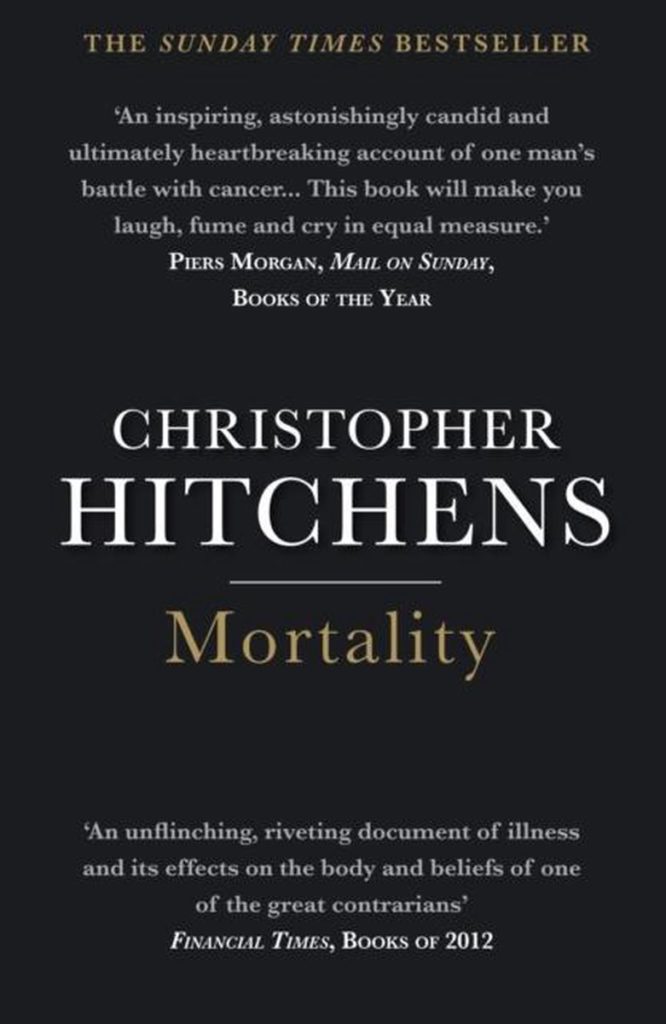Last Updated on 2022-07-08 by Joop Beris
Mortality by Christopher Hitchens first appeared in 2012. It’s been sitting on one of my bookshelves for quite some time because something held me back from reading it. Hitchens wrote it when he “lived dyingly” as he put it, from esophageal cancer. That alone should be enough to tell you that it isn’t light reading, despite the fact that it is a short book. Finally I read it this week so here it is at last, my book review: Mortality.
Never meet your heroes

People famously say that you should never meet your heroes. While I can’t say that Hitchens is one of my heroes, I freely admit that he is an example, one of the people I admire. A champion of free expression and someone not afraid to challenge public opinion or public figures, at the very least deserves respect. Even if you disagree with what they say. In my opinion, Christopher Hitchens had a talent to disagree but to do so with style, substance and humor.
A sharp mind, a quick wit, a vast repository of quotes and a wealth of information flowed freely from his mouth and his pen. I think I was mostly afraid to find that in his last published work, I would find the man somehow diminished, less formidable. To my relief, I was wrong.
Personal but detached
It’s unavoidable that Mortality is a personal book. Hitchens describes how he found out that he had cancer and the prognosis given. His cancer had metastasized and was in stage 4 about which he dryly remarks: “there is no stage 5”. It’s just about the worst news anyone can receive but it is written down very matter-of-factly with a stoicism that is admirable. This is the tone for Mortality, both personal but also dry and to the point. Many people in a similar situation might exclaim “Why me?” but ever the realist, Hitchens flips it around. You can almost picture him shrugging as he writes “Why not me?”
He freely admits that his lifestyle, of which drinking and smoking were a substantial part, could be described as burning the candle at both ends. A diagnosis of cancer was unsurprising or even banal, as he puts it. Always hopeful of a cure but never unrealistic in his expectations, Hitchens describes in detached tones the effects cancer has on his body, his relationships and his outlook on life. He combines this with other observations, contrasting them with normal life and life in “Tumor-town” as he called his life with cancer.
Never pathetic
As personal as Mortality is, it never becomes overtly emotional or descends into the pathetic. You can sense his desire for living and his passion for learning and exchanging ideas. At the same time, you can sense the underlying emotions as he describes how his body is failing him, betraying him. The emotion is there, under the surface, between the lines. The emotions it provokes in the reader are perhaps even stronger precisely because the book steers away from the dramatic.
I have written about my own views on mortality but I can only hope that when my time comes, I have the same composure and the same fortitude. Hitchens shows that atheists can face death honestly, not afraid of damnation but at the same time not looking forward in vain to salvation. As always there are people who will claim deathbed conversions but they do that for their own purposes.
Conclusion
So we come to the conclusion of my book review of Mortality. Is it Hitchens’ best book? No, I can’t say that it is. It’s short and we know that in the end it doesn’t end well. Christopher Hitchens died on the 15th of December 2011 so there’s no happy ending. But not all stories can have a happy ending and even though it doesn’t end well, this book teaches an important lesson. Because death is inevitable, it’s no use being scared or pretend as if death will make an exception in our case. Like it or not, we all “live dyingly” but most of us don’t know how many days, months or years we have left. What matters is what we do with the time we have. And for that, the book is a true inspiration. An inspiration which is part of Christopher Hitchens’ legacy.

